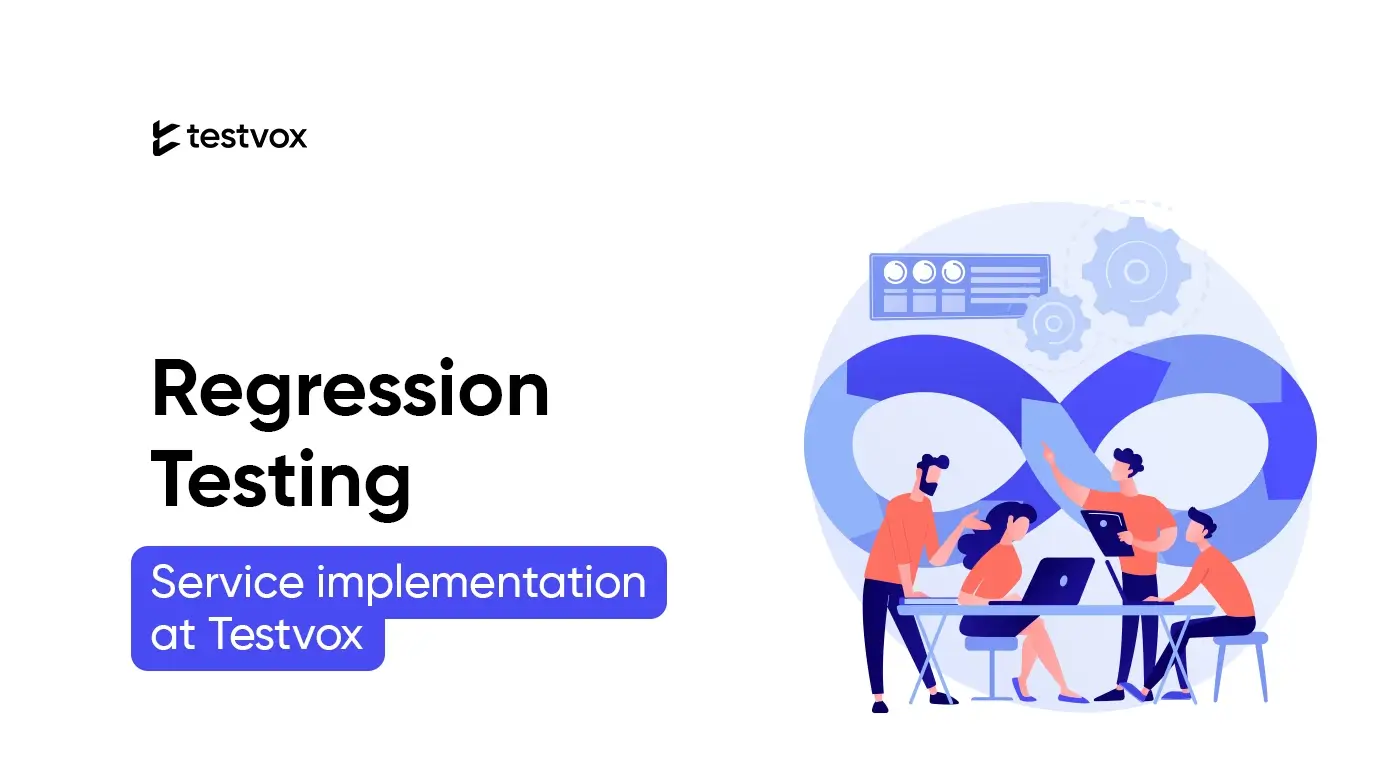 7 June 2023
7 June 2023

Regression Testing Service implementation at Testvox
 22 November 2025
22 November 2025
 6 MIN READ
6 MIN READ
What is Regression Testing?
A type of software testing that assures the consistent functioning of all previously existing features and functionalities of an application software after a new feature has been launched into the application or a code change on behalf of this application software has been made is called Regression Testing. We re-execute all test cases regarding the existing features and functionalities of the application software to ensure this. To ensure consistency, we again test those parts of the application software components unaltered by the latter code changes.
Regression Testing also ensures the non-reappearance of the bugs already fixed before the code update. It is a vital part of software maintenance. The number of test cases mapped to regression testing will increase after each code update in the software application. This is due to the accommodation of new test cases corresponding to the newly introduced functionality changes and features. When conducting regression testing next time, execute these new sets of test cases in addition to the already existing ones.
Why Regression Testing
We need to plan this testing strategy when:
We have received a requirement to change the code of the application software in order to update any of the existing functionality, or
A client has submitted a requirement to introduce a new feature or functionality in the application software.
So any sort of modifications or updates to an application software invites the necessity of executing regression testing after its completion. Sometimes the need for code optimization for an application software may also trigger the execution of this type of testing to ensure that the application software works the same way as it worked prior to the code optimization.
Over the last few years, software delivery cycles have become shorter, and updates are pushed more frequently. This has increased the dependency on regression testing to maintain stability. Modern applications are also built with microservices, meaning a small change in one service can impact several related services. This makes regression testing a safety net that prevents unpredictable failures during production releases.
Clients today expect uninterrupted performance, especially when products serve industries like fintech, healthcare, travel, and retail. A minor performance issue or broken functionality after a new release can affect revenue directly. Because of this, regression testing is no longer seen as an optional step but an essential quality measure that protects the business.
Regression Testing Methods
Basically, there are 2 methods
(i) Manual Regression Testing.
(ii) Automated regression testing.
We initially prepare test cases that correspond to the functionalities and features of the application software. Each test case represents a sub-functionality, functionality, or feature. It consists of a sequence of events to be executed that are numbered stepwise. We manage the created test cases using a testing management tool.
Manual Regression Testing
The Software Testers create the test cases related to the areas of the application software given for testing. They proceed with running the application stepwise as entered in the test cases. The software testers execute test cases one by one, report the bugs found to the clients, and keep track of them using a testing management tool. Manual testing is advantageous when,
(i) We test the functionalities and features that change frequently,
(ii) The product given for testing is not yet stable, and
(iii) The functionalities and features that are difficult to automate are tested.
Manual regression testing continues to be valuable because not all features behave predictably. Elements such as visual layouts, new UI designs, user flows, or experimental features often require human observation. Even in 2026, testers still play a major role in identifying subtle usability issues that automation tools cannot easily capture.
Manual regression testing also helps detect issues caused by third-party integrations. Since many modern apps depend heavily on payment gateways, analytics systems, authentication services, and external APIs, testers often validate these connections manually to ensure nothing breaks after updates.
Automated Regression Testing
To make this type of testing possible, we need to fulfill the prerequisites listed below.
(i) We need to run the sequence of events incorporated into each test case in the application software given for testing. An automation tool should record them simultaneously. We must save these recordings and ensure they are ready for execution at any time, or
(ii) We need to write a series of scripts corresponding to the sequence of events incorporated into each test case. The automation tool we use should support the scripting language used to write these scripts. We should save them and make them ready for execution at any time.
We execute the series of pre-written scripts or run the saved recordings for automated testing. They correspond to test cases belonging to the modules of the application to be tested after a code change.
Automated Regression Testing has the following attractions
(i) The manual regression testing process is slow and time-consuming, and can be tiresome and error-prone. Automation of regression testing overcomes these vulnerabilities, and the recordings or scripts can be run continuously for days with the automation tool without exhaustion, unlike humans. This makes faster delivery of the product possible.
(ii) The software testers can be allocated to work on more valuable tasks as automated regression testing requires little human intervention.
(iii) This type of testing is the best option to test scenarios or functionalities that are predictable or stable and frequently repeated.
Automation tools have now improved their intelligence by using smart locators and self-healing mechanisms. These features automatically fix broken selectors during execution, reducing maintenance time drastically. This is especially useful in regression testing, where even small UI changes can break multiple automated scripts.
Cloud-based execution platforms have made automated regression testing more scalable. Teams can run hundreds of test cases across different browsers, devices, and operating systems at the same time. This increases test coverage and speeds up delivery without adding extra infrastructure costs.
API-based regression testing has also become important because many applications now rely heavily on backend services. Automated scripts validate API performance, response formats, and security every time a new release is pushed.
Implementation of Regression Testing at Testvox
Testvox handles both manual and automated regression testing based on
(i) Requests received from clients, or
(ii) As per the requirements identified while proceeding with the testing of the application software.
The automation tools used mostly are Selenium WebDriver for testing web applications, WebdriverIO for testing both mobile and web applications, APPIUM for testing mobile applications, etc.
Test cases are created module wise initially based on the requirements when an application software is entrusted to us for testing. We then decide on the testing method that we follow.
(i) If clients suggest or we decide on manual testing based on the testing project, our software testers will execute each test case stepwise on the software application given for testing.
(ii) If we recommend automated regression testing, our software testers will create test scripts. An alternative is to execute the stepwise actions in each of the test cases, record them using the automation tool, and save them. We run these test scripts or recordings on the application software during automated regression testing.
We will report bugs found after the completion of the regression testing. On rectification of these bugs, the whole collection of created test cases regarding or related to the modules where bugs were found will be executed again, either manually or using an automation tool. This ensures the absence of all previously identified bugs and new bugs.
We will deliver the test scripts created corresponding to the formed test cases to the clients upon their request. We will also impart the knowledge on their functioning to the clients through knowledge transfer or mentoring sessions. So even after the completion of the contract with Testvox, the clients can utilize these test scripts on their own when required for testing their software application.
Recent Improvements at Testvox, 2026
Over the last few years, Testvox has strengthened its regression testing process to match industry expectations. Several new practices have been introduced to ensure stable and seamless updates for client applications.
Testvox now uses AI-assisted test analysis to identify which test cases need to be prioritized after every new update. This reduces execution time by avoiding unnecessary test runs and focusing on the parts of the application most likely to be affected.
The team also performs impact analysis using dependency mapping. This allows testers to understand how a code change affects related modules. As a result, the regression suite becomes more accurate and less repetitive.
Visual regression testing has been added for applications with complex user interfaces. This ensures that UI components, layouts, or branding elements remain consistent across releases.
Testvox has expanded its device and browser matrix to support a wider range of environments. With users accessing applications through different devices, resolutions, and operating systems, broader testing is essential.
The company has also adopted parallel execution strategies, enabling much faster completion of regression cycles. This is beneficial during urgent releases where time is limited, but reliability cannot be compromised.
 BY
Divya Prakash
BY
Divya Prakash






